新编英语语法教程 复习资料
新编英语语法教程第11讲

5.我多么希望你也在这里和我们在一起. A: How I wish you were here with us. 6.Jane 告诉我,你明年即将进大学. A: Jane told me you were going into the college. 7.罗马建成非一日之功. A: Rome was not built in a day.
• • • • • • • • • • •
Exercise 11A 1. 滴水穿石。 A: Patience wears out stones. 2. 骄必败。 A:Pride goes before a fall. 3。事实胜于雄辩。 A: Facts speak louder than words. 4。一燕不成夏。 A: One swallow doesn’t make a summer. 5。长江流入东海。 A:Changjiang flows into the East China Sea.
class. • 11. 我们的公司并非总是高额赢利. • A: Our company does not always make high profits.
• • • • •
• • • • • • •
12. 母亲通常不在早晨喝咖啡. A: My Mum usually doesn’t have coffee in the morning. 13. 她几乎从严不在午夜之前就寝. A: She hardly ever goes to bed before mid-night. 14. Arizona州首府凤凰城( Phoenix) 天气很干燥;几 乎不下雨。 A: Phoenix, the captital of Arizona, is dry and it hardly rains. 15. 星期日我父母很少去做礼拜. A: My parents seldom go to church on Sunday. 16. 地球围绕太阳转. A: The Earth moves around the Sun. 17. 印度位于中国迤南. A: India lies to the south o• •
新编英语语法教程Pronouns
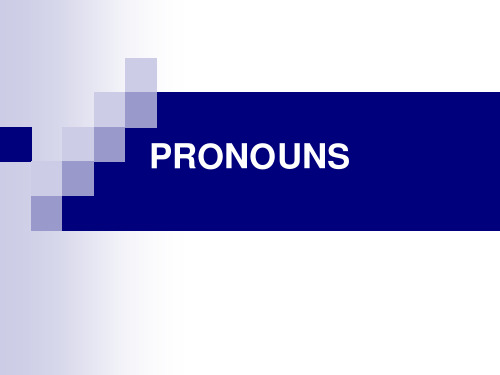
Personal pronouns:
I/ me, we/ us, you, he/ him, she/ her, it,
they/ them
Possessive pronouns:
my/ mine, our/ ours, you/ yours, his/
his, her/ hers, its/ its, their/ theirs
subjective case -------subject position objective case ------ other positions
2. minor sentence 3. everybody/ nobody + but/ except +
pronouns
Informality
Reflexive pronouns:
Reciprocal pronouns:
each other(‘s), one another(‘s)
Demonstrative pronouns:
this, that, these, those, it, such, same
This book is yours, and that is mine.
other night.
Concord in number
NUMBER: Antecedent: everyone, anyone, everybody,
anybody, no one, nobody, someone, somebody Pronoun?
The cast is giving ___ (its, their) bester, either.
I have do much work this morning.
英语语法复习资料大全

语法复习精品指南(一)词类(parts of speech)英语的词通常分为十大类:1)名词(noun,缩写为n.)是人和事物的名称,如pen(钢笔),English(英语),life(生活)。
2)代词(pronoun,缩写为pron.)是用来代替名词的词,如we(我们),his(他的),all (全部)。
3)形容词(adjective,缩写为adj.)用来修饰名词,如great(伟大的),honest(诚实的),difficult(困难的)。
4)数词(numeral,缩写为num.)是表示"多少"和"第几"的词,如four(四),eighteen(十八),first(第一),eighth(十八),hundred(一百)。
5)动词(verb,缩写为v)表示动作和状态,如write(写),walk(行走),think(想)。
6)副词(adverb,缩写为。
adv.)是修饰动词、形容词和副词的词,如quickly(快),of ten(经常),very(很)。
7)冠词(article,缩写为art.)说明名词所指的人或物的词,如a,an(一个),the(这,那)。
8)介词(preposition,缩写为prep.)表示名词(或代词)与句子里其它词的关系,如fr om(从),in(在…内),between(在…之间)。
9)连词(conjunction,缩写为conj.)是连接词、短语、从句和句子的词,如and(和),because(因为),if(假如)。
10)感叹词(interjection,缩写为int.)表示感情,如。
oh(噢),aha(啊哈),hush(嘘)。
[注一]属于前六类(名、代、形、数、动、副等词)的词都有实义,叫做实词(notional word)。
属于后四类(冠、介、连、感等词)的词没有实义,叫做虚词(form word)。
[注二]不少词可以属于几个词类,如work(工作;动词和名词),fast(快;形容词和副词),since(自从;连词和介词)等。
《新编英语语法教程》1-3
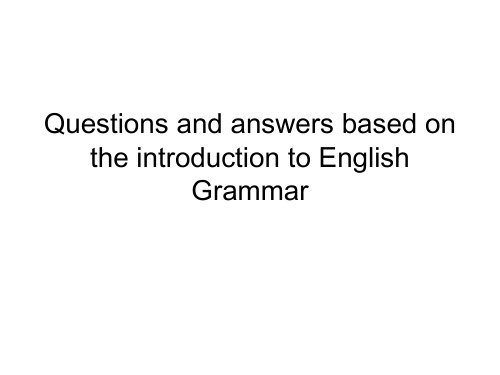
句 子 成 分 主 主 语
定
义
常用词类或表现形式
名词、代词、数词、名词化的其 他词类、不定式、动名词、分句 单个/并列实意动词或短语动词 情态动词+原形动词 系动词+主语的表语(名词、代 词、数词、形容词、副词、介词 短语、非谓语动词、从句) 不及物动词come, go, leave, arrive, return, rise, die, live 等 + 名词、形容词或分词 名词、代词、数词、名词化的其 他词类、不定式、动名词、分句
Questions and answers based on the introduction to English Grammar
Lecture 1
Sentence Structure
( p.p.13—21)
I. Clause elements
Subject (p.13) Predication (p.13) Predicate verb Object (direct object, indirect object, complex object) Complement (subject complement, object complement) Predicative Adverbial Attributive/ Attribute Appositive e.g. S1: Henry is the most studious in the class. S4: Jennie’s paintings were judged inferior to Wanda’s. The experts judged Jennie’s paintings inferior to Wanda’s.
要 成 分 谓 语
新编英语语法教程第16讲
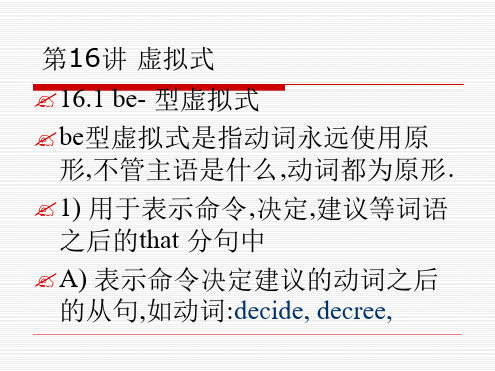
? 4. 董事会决定任命约翰逊为总经理 . ? A:The board decided that Johnson be appointed
general manager.
? 5. 如果我是你,我会勇敢地正视这一问题 .
? A: If I were you, I would face up to the problem.
? 6. 假如我身体好一些 ,我早就离开这里了 . ? A:
If I were in better health, I would have long left this place.
? 7. 我非常不愿意眼看他犯错误 .
? A: Far be it from me to see him make a mistake.
?C) 用在一些形容词后的真实主语 从句中.如形容词:advisable, appropriate, desirable, essential, fitting, imperative, important, impossible, necessary, obligatory, proper等.
?It is essential that all the facts be examined first.
you took a rest. ?It's high time we left this place.
?B) I would rather/ sooner that… ?I would rather she got home a little
earlier. ?I'd rather he told me the truth. ?I would rather he had been present. ?C) If only… ?If only I knew her address.
《新编英语教程》1-2册语法点
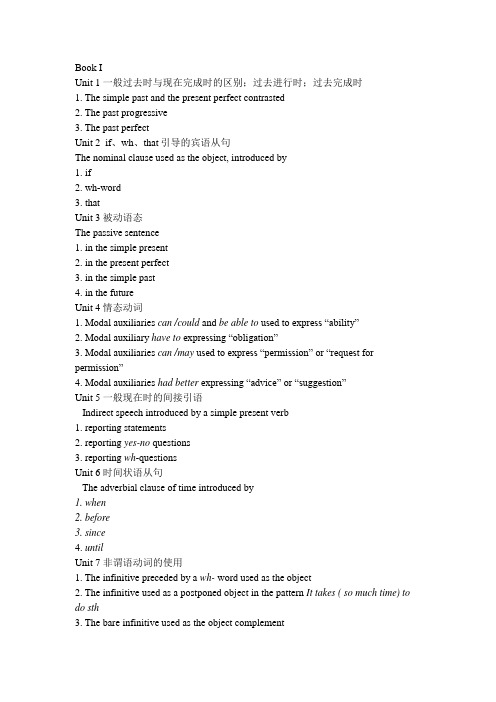
Book IUnit 1 一般过去时与现在完成时的区别;过去进行时;过去完成时1. The simple past and the present perfect contrasted2. The past progressive3. The past perfectUnit 2 if、wh、that引导的宾语从句The nominal clause used as the object, introduced by1. if2. wh-word3. thatUnit 3 被动语态The passive sentence1. in the simple present2. in the present perfect3. in the simple past4. in the futureUnit 4 情态动词1. Modal auxiliaries can /could and be able to used to express “ability”2. Modal auxiliary have to expressing “obligation”3. Modal auxiliaries can /may used to express “permission” or “request for permission”4. Modal auxiliaries had better expressing “advice” or “suggestion”Unit 5 一般现在时的间接引语Indirect speech introduced by a simple present verb1. reporting statements2. reporting yes-no questions3. reporting wh-questionsUnit 6 时间状语从句The adverbial clause of time introduced by1.when2.before3.since4. untilUnit 7 非谓语动词的使用1. The infinitive preceded by a wh- word used as the object2. The infinitive used as a postponed object in the pattern It takes ( so much time) to do sth3. The bare infinitive used as the object complement4. The –ing participle used as the object in pattern Would you mind…Unit 8 关系分句1. The relative clause introduced by that(as the subject)2. The relative clause introduced by that (as the object of a verb)3. The relative clause introduced by who,whomUnit 9 真实条件句与非真实条件句1. Sentences of real conditions2. Sentences of unreal conditions related to the present with be /have /action verbs in the conditional clauseUnit 10将来进行时,将来完成时与将来完成进行时1. The future progressive2. The future perfect3. The future perfect progressive.Unit 11 名词性从句Master the use of English nominal clauses and review indirect speechUnit 12 被动语态Master the use of passive voiceUnit 13 情态动词Modal auxiliaries: may/might, should/ought to, would rather, must/can‟tUnit 14 间接引语Indirect speech introduced by1. a simple present verb reporting past events2. a simple past verb reporting questions and answers3. a simple past verb reporting a conversationUnit 15 状语从句(地点,条件,原因,让步)The adverbial clause1. of place introduced by where2. of condition introduced by unless3. of cause introduced by because/ since4. of concession introduced by thoughUnit 16 现在分词1. –ing participle used as the object2. –ing participle preceded by go3. –ing participle used as the subject4. –ing participle used as the object of a preposition5. –ing participle used as a noun modifier6. –ing participle used as the object complement7. The infinitive preceded by in order expressing …purposeUnit 17 whose,whom引导的关系分句1. The relative clause introduced by whose.2. The relative clause introduced by w hom (as the object of a preposition)3. The cleft sentence with attention focused on various sentence elements.4. The relative clause preceded by a noun which is modified by a superlative. Unit 18 非真实条件句1. Sentences of unreal conditions making a supposition about the future2. Sentences of unreal conditions with past non-facts and present imaginary consequences3. Sentences of unreal conditions with past non-facts and past imaginary consequencesBook IIUnit 1 现在完成进行时,过去进行时与过去完成进行时Unit 2 名词性从句Unit 3 被动语态Unit 4 情态动词Unit 5 间接引语Unit 6 状语从句(目的,结果,让步)Unit 7 非谓语动词Unit 8 关系分句(关系副词)Unit 9 虚拟语气Unit 10 将来时间表示法Unit 11 it 引导的名词性从句Unit 12 被动语态Unit 13 情态动词Unit 14 间接引语Unit 15 状语从句Unit 16 非谓语动词Unit 17 关系分句(介词+关系代词)Unit 18 非真实条件句。
《新编英语语法教程》1-3讲

要 成 分 谓 语
动词性 复合 复合谓语 谓语 名词性 复合谓语
双重谓语
由不及物动词+主语的 不及物动词come, go, leave, 表语构成,表现主语的 arrive, return, rise, die, live 等 双重状况 + 名词、形容词或分词
次 要 成 分
宾语、补足语、定 语、同位语、状语
句子的主体,叙述的中心,表明 所说的是“谁”或“什么”
要
成 分
简单谓语 说明主语的行为、动作、特征或 复 动词性 复合谓语 所处的状态,即“是什么”、 合 谓 谓 名词性 “干什么”、 “怎么样” 语 复合谓语
语
双重谓语
由不及物动词+主语的表语构成, 表现主语的双重状况
直接宾语
宾 语 间接宾语 复合宾语 介词宾语 宾语补足语 主语补足语 定语 同位语
Note 1: Single subject/predicate S–V and Compound subject/predicate (p.14)
S1: The boys and the girls are planning a dance. S V S S4: Leah jumped on her bike and rode around the block. V S V S7: Her brother and her sister were very shy and were really hard persons to get know. S S V V
《新编简明英语语言学教程》1-6章期末复习
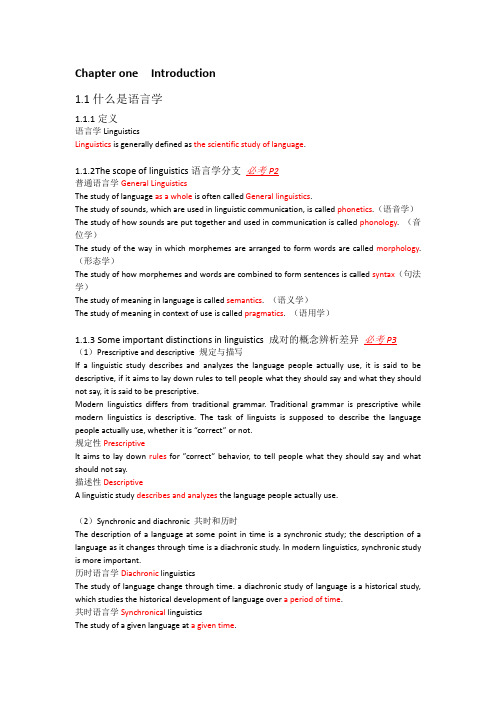
Chapter one Introduction1.1什么是语言学1.1.1定义语言学LinguisticsLinguistics is generally defined as the scientific study of language.The study of sounds, which are used in linguistic communication, is called phonetics.(语音学)The study of how sounds are put together and used in communication is called phonology. (音位学)The study of the way in which morphemes are arranged to form words are called morphology. (形态学)The study of how morphemes and words are combined to form sentences is called syntax(句法学)The study of meaning in language is called semantics. (语义学)The study of meaning in context of use is called pragmatics. (语用学)1.1.3 Some important distinctions in linguistics 成对的概念辨析差异必考P3(1)Prescriptive and descriptive 规定与描写If a linguistic study describes and analyzes the language people actually use, it is said to be descriptive, if it aims to lay down rules to tell people what they should say and what they should not say, it is said to be prescriptive.Modern linguistics differs from traditional grammar. Traditional grammar is prescriptive while modern linguistics is descriptive. The task of linguists is supposed to describe the language people actually use, whether it is “correct” or not.规定性PrescriptiveIt aims to lay down rules for ”correct” behavior, to tell people what they should say and what should not say.描述性DescriptiveA linguistic study describes and analyzes the language people actually use.(2)Synchronic and diachronic 共时和历时The description of a language at some point in time is a synchronic study; the description of a language as it changes through time is a diachronic study. In modern linguistics, synchronic study is more important.历时语言学Diachronic linguisticsThe study of language change through time. a diachronic study of language is a historical study, which studies the historical development of language over a period of time.共时语言学Synchronical linguisticsThe study of a given language at a given time.(3)Speech and writing 口头语与书面语Speech and writing are the two major media of communication. Modern linguistics regards the spoken form of language as primary, but not the written form. Reasons are: 1. Speech precedes writing; 2. There are still many languages that have only the spoken form; 3. In terms of function, the spoken language is used for a wider range of purposes than the written, and carries a larger load of communication than the written.(4)Langue and parole 语言和言语必考名解P4The Swiss linguist F. de Saussure made the distinction between langue and parole early 20th century.Langue refers to the abstract linguistic system shared by all the members of a speech community, and parole refers to the realization of langue in actual use. Saussure made the distinction in order to single out one aspect of language for serious study. He believes what linguists should do is to abstract langue from parole, to discover the regularities governing the actual use of language and make them the subjects of study of linguistics.语言langue(抽象)The abstract linguistic system shared by all members of a speech community.言语parole(具体)The realization of langue in actual use.(5)Competence and performance 语言能力和语言运用Proposed by American linguist N. Chomsky in the late 1950’s.He defines competence as the ideal user’s knowledge of the rules of his language, and performance the actual realization of this knowledge in linguistic communication. He believes the task of the linguists is to discover and specify the language rules.语言能力Competence(抽象)Competence is the ideal user’s knowledge of the rules of his language.语言运用performance(具体)Performance is the actual realization of this knowledge in linguistic communication.语言运用是所掌握的规则在语言交际中的具体体现。
新编英语语法教程第六版课后全

1A1B2AWithin the stricken area,not a single soul remained alive,and the city centre looked as if it had been razed by a monster steam-roller.The bomb exploded 1,000 the ground.On August 6,1945,an American aircraft dropped a bomb on the Japanese townof Hiroshima.Three days later,yet another bomb of the same kind gave the town of Nagasakithe same fatal blow.The explosion made one and a half square miles of the city an expanse of reddishrub-ble.Within the fraction of a second,the bomb changed from a metal cylinder into an im-mense mass of expanding gas,millions of degrees hot.A tremendous blast of hot air whirled the debris of stone,concrete,metal,and woodover the ground.2BPond,once praised by Thoreau for its natural beauty,is now the site of manytourist stands.2. Almost every summer night the cooling northeast w ind swept through our bedroom windows, making air conditioning unnecessary and a light blanket welcome./ Sweep-ing through our bedroom windows almost every summer night,the cooling northeastwind made...3. The steep surrounding slopes were capped with snow, which fed two streams plungingdown to join in the valley below.the river on one side and a large tree providing shade,this is a good spot for apic-nic,and we can spread our blanket on the grassy knoll.for breath after running up the stairs,Mr Wood stood at his neighbour's doorand knocked again and again till someone opened it.town folk envied Horace, who had come into a small fortune with which hebought abig house and obtained a partnership in the biggest grocery in town.in front of the mirror,Jim looked at his image,wondering at the big changethat had come over him in recent years.idea that his only daughter whom he had greatly wronged might never forgive himalmost drove him mad.9. The story, written in plain language, consists of three parts with an interesting plot cen-tering round an aristocratic family living in 17th-century France.and shivering,John sat hunched over a bowl of hot broth prepared by hisfatherto drive off the chill.above the waters of a beautiful lake and over the tops of the tall pine treesgrowingon the steep slopes of a hill stand five Chinese-style pavilions.12.Farther down the street,the old man stopped and leaned against a lamp-post, listeningto a cheerful song coming out of a restaurant on the opposite side of the street.sank in the nearest chair,completely exhausted,her limbs stiff with a piece of blank.the day Mrs Rymer behaved very properly,her pleasant,refined facewearing a grave look,her elegant figure wrapped in deep mourning while cold,her mind occasionallyshe uttered a sigh or a sob.thought it necessary to break the news to his family,that Mr Jacob,his former employer,had promised him a half-day job at 20 pounds a week. 3A,I will have to...,I was...,there has been...,Roberts returned the cheque.5.Oddly enough, he did not...unreasonably, he protested...,he never knew that he...,the two sides may...9.Quite obviously, he does not want to...enough,the burglar had not taken...enough,a solution will be...,the Chinese people protested...more important, we ought to put...,I have met him before.15.To our regret,he refused ourinvitation. ,someone managed to find me.telephoned the hospital first,quiterightly. ,the girl did not ask your name.,her appointment has not been confirmed.20.Curiously, the dog never barked.3Bother wordsother words/That is to say5. In that caseallall thata result;Secondly;Thirdly and most importantly 4Ahavewere,arearewere4B,is,are,their,their,It,wasThey,is/are,their,they,disapprove ,they5A5B 1.'s10.'s ,is,isareare point are5C are areare arehave caresis,has 6A6Bmuch work have you done this morning?dig a tunnel will need a great amount of labour.'s done the least work.4.There are several methods of approaching this problem.know little French.must be less empty talk but more practical work.7.Were there many people at the reception?I have a few words with you?9.There were fewer people today at the exhibition than yesterday.made the fewest mistakes.'ve learnt more poetry and done more exercises than I have.'s done the most work and made the most mistakes.'s done a lot of work and made a lot of mistakes.millionaire has lots of money-and lots of worries.has enough worries because she hasn't got enough money.telephone rang every few minutes.have been persisting in making the experiment all these last few cold days.his next books on English linguistics will come out in 2020.we learned that we had to wait another three more weeks.brother spent $1,000 for a second-hand car,but I spent almost twice the amountfor the same stuff. 7Aadviceimportant piece of information it is funnot numerousarehastimes,rivalry,wereisis7Bswarm7C1.... Dick's decision to emigrate to Australia.expansion of the Physics Department/The Physics Department's expansion...3....a novel of Jane Austen's.long report of Mr Allen's...new shoes of yours...6....the article of the student...7....Shakespeare's tragedies/the tragedies of Shakespeare8....a ship's carpenter.punishment of the offenders...10....the past decade's events/the events of the past decade11....the enemy's unconditional surrender/the unconditional surrender of the enemy.12....other people's criticism of him.13....the younger generation's education/ the education of the younger generation.14....at John Wiley's,the bookseller's.15....an article of '...16....this policy of the government's...?17....an idiot's tale.dog of Frank's...book of Joe Hill's...'...7Aleg of the table is broken.Key to Exercises 229and John's house is on the corner.3....on birds'nests.4....the students'problems.5. ... at the Joneses'.6./7.... Charles' car but someone else's.8....in ten years'time.9. The products'effectiveness...week's news...than the last two weeks'.11....others'problems.12....each other's worries.13.My brother and sister-in-law's house... friend of my father's...wheel of the car...16./17.The baseball players'wives...18....women's clothing only.ton's long poems.new shoes of yours...8A8B.,money,etc,ones,cause8C8A1....little opportunity to travel.2....many such novels.3..../ Neither sentence is correct English.4. He has many more problems...5....this kind of apple/ these kind(s)of apples.enjoy either kind,...7....every book in the fiction section.8....than in any other country in the world.9....a greater amount of rainfall this year than there was last year.10....all this luggage/all the luggage at the airport.11....such beautiful poetry/such a beautiful poem that it is hard to believe shehas neverhad a formal education.12....a great many friends in New York.13.Whatever nonsense...third sister of his...can't for the life of me remember.there are fewer/ less diseases...17....than all other methods.18.... once every three months.19....study of language.20....some more soup?8EOf all the things we eat and drink,water is the most many people un-derstand this,but it is quite human body can go without food for a long time,but two or three days without water will result in death.Many people do not understand how much water the human body needs to work properly,and many people do not drink people drink when they are thirsty,but often need muchmore,especially when they have been taking exercises.It is vital that people should drink enough water every can help people tokeep can also ease pain in case of habit of drinking water soon after gettingup will bring a purging and refreshing effect;likewise,drinking some water beforebedtimewill also do people,especially old people,a lot of good. Whenone is fainting,water willbring him back to consciousness;if one is badly wounded, water will help to lendhim vig-a word,water means lack of water in the body is most harmful to health. 9A,an,the,the,a,the,the,the,the,0,the,a,an,a,the,the,a,the,the,the,the,the,the,0,0,0,0,0,0/a9Bthe9CM ichigan3.The Straits of Gibraltar4.Qomolangma5.The NationalGallery World Cup8.The Olympic Games 10.the BBC12. The Times14. the Finance Ministry16. the SenateJohn Spenceand Smith Watermans20. The White Houseuniversityhospitaltrain28.The hovercraft, the boat taxibusferrycinema35.Thefilm Popeworld9AI.15. Sam's II.9Ethe spottop to bottom handur the fronta fashiona fancy tocase ofthe fancy oftrouble,lend a handthe boardreach oftop ofthe case ofthe shadea losspossession of thepossession of18.under coverthe midnight oil20. at short notice9Ftravels faster than sound.quiet,'t let me hear a sound.writing English,after each word we leave a space.box occupies too much space.a big meal,you should take a rest.needs food,drink and rest.7. He did it out of kindness.have done me a kindness.9.He lives close at hand.10.The children suffered a lot at the hands of their stepfather.you got an English-French dictionary?12.Have you got an English and a French dictionary?do you like the red and white roses in my garden?you seen the red(roses)and the white roses in my garden? is still in hospital. 'm going to the hospital to see him.is a garden in front of the house.is a picture in the front of the book.style of dress is no longer in fashion.likes to read about the latest fashions.'t talk too much at table.friend was sitting at the table writing a letter.23.When we called, his family were at dinner.we called,his family was giving a dinner.students take/ took quite a fancy to their teacher.exhibits in the hall soon took the fancy of the visitors.old man is in possession of a huge fortune.island was once in the possession of Great Britain.must immediately consult a doctor in case of illness.is stupid,but it is different in the case of Mary;she is just lazy.10AWhen it comes to making a conscious effort to help keep a public place clean,mostpeople just don't make the 'm a maintenance man for a department peopledid make the effort,I probably wouldn't have a job.The area that I have to spend the most time cleaning is the employees'lunchroom .Employees go there during breaks,lunch,and dinner.The maintenance department sup-plies containers for garbage and ashtrays for cigarette butts.But when they finish their food,the employees will either throw their papers on the floor or leave them on theemployees will on occasion throw their papers in the garbage container,but most of themwho smoke will either flick their ashes on the floor or in the half-filled sodabutts are found anywhere other than in the ashtray,because the ashtrays may havebeen sto-len or have been filled with gum. Sometimes an employee will remark, “ Aren't these peo-ple pigs? They don't even clean up after themselves,"as they proceed to walk awayfromtheir littered table.10B,hehas,it has totheirthem(informal)is/ they are(informal)their(informal)'t ittakes(informal),their/his(informal)their(informal),her,his,themselves,itself10Csheherone's(too formal),he/ one(too formal),his/ one's(too formal)shehe or she(formal), shehe/ he or she(formal)her12.his/his or her,his/ his or her, his/ his or her himhim,it/hehe or shehershehe or shehe or she,he/he or she10Aelse's,her11A,ours,it'shisprofessor himselfherself6.besideourselves himselfhe himself(no change in informal 10.(no change) style)she herself(no change in informal style), who (no change in informal style)arriving late(no change in informal style)28.he himselfheyou're11B,any,anyless,neither,all11C1....to teach the facts of life to their children.2....to change this situation...3....with great potentials which are not enhanced...4....major in accounting.Ellis challenged Jody Baker to a game of chess when they met at the RecreationCentre.morning's paper says that Route 4 can't be used until the flood damage is repaired.a hill was situated the cottage, which...8.Two weeks after his uncle moved to Florida, Ed sold...9....as if the jails were equipped with revolving doors.put the package of frozen strawberries...she left for Europe,Mother asked Mrs Spry to visit her.12....this vitamin, which is essential to sound teeth.'s being given the leading role in the play displeased the rest of the cast.14....all the clothes stored in the attic were ruined.and Jan wouldn't even look at each other when they met...her arrival in New York,this was the first time that she had seen her mother.17.... pleased Mother tremendously.18.... Those/ The people interviewed are sometimes indignant.he spoke to the lawyer, Dad was extremely nervous...20....that the holiday makers can hardly find places to sit down,which is why those peoplewho hate crowds keep away from these places.11A12Ais likely to let you down.team is certain to win.appears to be no doubt about it.happened to be the only witness.chanced to be out of London at the time. doesn't seem to be coming after all.'re not supposed to play football on Sundays. is supposed to have arrived at five.9.He's sure to be there.are certain to need help.think it's going to rain this evening.am I to pay my debts?new building is going to be six storeys high.'re not to talk like that.'s likely to see her.16.You've got to be joking.17.He tends to be stupid. fail tosee what you mean. happenedto be there. chanced to meethim in the park. appeared toenjoy the concert.22.They seemed not to notice it.23.The swimmer failed to reach the shore.were to have been married in May. pursewas not to be found.26. He was never to see his wife or children again.'s going to be a long time before we can reduce our prices. is bound to be in the office.of us can say what our future is to be.did not fail to keep his word.12B2.called off3.carry out4.catch up with5.came round / to6.cutting down7.looked intoupupoffhim outyou off13.leave outupup16.blew it up17.Look out18.put off19.look on20.put up21.running into22.run up againstoutfor/ call in...in26.turned down27.turned outoutup30. took on,worn out,give...up12C1.This case is being looked into by the police.long the children had taken to their new teacher.3.We can't rely on other countries to help us tide over the difficulty.4.The First World War broke out in 1914.she came to,she found herself lying in a hospital.6. He was not really feeling sad. He was just putting on.new problems cropped up at the last minute.8.As most members were absent,the meeting had to be called off.you figure out a way to solve this problem?10.When he was criticized, he flared up.'t be taken in.12.I got very angry that he should come out with that rude remark. mustwork hard,or you won't be able to keep up with the rest of the class. isgoing to take a day off tomorrow;I must fill in for her.15.We are going to bring up this question at the next meeting.'m looking forward to meeting you in Shanghai.17. We all look up to Doctor Lin,because she serves her patients selflessly.worked in the United States for three years,and he made the most of the opportu-nity to improve his English.was so lazy that she made a mess of her room.is a used car;it has changed hands several times.12A(1)finding(2)occurred (3)waiting(4)studied(5)stood(6)read(7)read(8)decided(9)satisfy(10)carried (11)colored (12)taste(13)watching (14)slipped (15)took (16)found(17)was(18)ran (19)shouted(20)drank(21)tasted (22)was(23)learned (24)to question13Awears out stones.2.Pride goes before a fall. speaklouder than words. swallowdoesn't make a summer.5.The Changjiang flows into the East China Sea.6.Water doesn't exist on the moon.isn't ever cold in Hawaii.in Paris isn't always nice;it sometimes rains a lot.9. He occasionally is wrong, but not often.never does any homework,but he does well in class.company doesn't always make very high profits.mother doesn't usually have coffee in the mornings.hardly ever goes to bed before midnight.,the capital of Arizona,is very dry;it hardly ever rains.parents seldom go to church on Sundays.earth revolves round the sun.lies to the south of China.Thames flows through London.usually vote for a Democrat,but my roommate almost always votes for a Republican. is an ill wind that blows nobody good.13Bwill see7. set to, did13. sleep / will sleep21. does not dislike(d)did,sat,began;is;is;sits;rubs;coughs13Cliving...standinggetting...spendingboilinggettingalways writing...talking about13.writes,know,is doing, Does your son write;hear,seems always hammering;keeps,begins,hear,shakes;do,think,is coming,is probably watches,gets,forgets,ispressing,is thinkingrunning;passes, kicks; heads, misses;hits,bounces;is happening;is ing;is running;is running;is blowing ironing,irons, lying;is hold-13A1.arrived, wastelephoning ,telephoned...do;was(just)doing(always)ringing5.was burning, was sleeping; was playing, (was) singing; was; stopped; woke6.was drowning, dived, savedlistening,rang,did not hear,was landing,climbed;were waiting, witnessed;was going(still)moving,jumped;thought, was happening,ran11.Did...want;hoped/ was hoping12.(1) was (just) hanging out(2)started (3) was wiping (4) lost (5) fell off(6)waswashing(7)rushed (8)knocked over(9)let(10)was talking(11)managed(12) was doing(13) cut(14) was peeling (15) was reversing(16) forgot(17) bumped14Abeen telephoning,Haven't you nearly finished; haven't got,have been trying, has beenbeen playing,haven't playedbeen writing/ have written4.have...been learning / have...learnedbeen sleeping/ has sleptbeen coughing/has coughedknown,have been reading,haven't finishedbeen,have..ebeen learning, has masteredbeen raining,has stoppedtravelled...readbeen readingread.letbeen crying17. has injuredbeen assassinatedbeen working20. has been losing14BI.(1)struck(2)reached(3)lit(4)sat(5)had left(6)had had(7)put(8)undressed(9)got(10)fell(11)had put(12)had forgotten(13)dropped(14)burned(15)found(16)had burned(17)had...madeI.(1)opened(2)saw(3)had...been listening(4)wondered(5)had heard(6)asked(7)had been doing/ was doing(8)said(9)had dropped(10)had been looking(11)didn't see(12)found(13)had...dropped(14)opened(15)had been taking(16)were(17)turned(18)asked(19)pulled(20)ran(21)recovered(22)had disappeared(23)moved(24)found(25)had been standing(26)had been telling14Cwere't said4.hadn't drunk,hadn't drunk expected,had intended't lost't toldhad knowncomemeantwanted't't beennever seengivenseenasked't brokennever been invented14Aexplainedhad,drove,got,gave;has been breathalysed ,had visitedtried6. will be, have had togoing to stay,will be,haven't been be,have taught;teach,take,will be ...getting on;have done,learnt...been;went,went,was,had been,liked,go 14E[1]1.Do you...knowwould like3. have just heardexactly suit't apply6.won't get8.had just left10.was going12.(had)found13.have heard't even know17.should/ would be.18.would phonetried20.doesn't/ didn't seem[2]upheardbeginninggone10.Would/ Could you please checkreceived12.have received/ did receive/received13.haven't decided14.should/ would be15.would tellalready been17.should/ would like18.don't get19.will have to21. w ill have/ have15Ajust be coming out2.will be, will be wonderingcome4.will be doing, will be working5.will get, will still be, will be going, will ask6.will be melting,will be7:.won't start,will give8.will tell9.will be reading, will be ringing10.will be cooking, will ringgoing to shampoo12.is going to bake, will soon getseegoing to havegoing to bottleyou going to paint,am going to takegoing to ringgoing to start,Are you going to do,is going to help19.will start,will get,will bakegoing to make,will burnarriving,Is he spending,is he catching,is spending,is giving,is attending going to dye,Are you going to do,are you going to have,am going to have going to rainyou doing,are coming,am going to show,Are you taking,am going to takegoing to send,am seeingmoving,Are you going to have,am going to paintgoing to buy,is going to beyou going to do,Are you going to sell,am going to learn,am getting,are starting,is cominggoing,is having,is looking,is coming31.will have finished, will be starting32.will have planted33.will have done, will be relaxing34.will have done, will soon beleaving be trying,will have sent36.will be living, will have spent37.will be giving, will have given38.will be coming, will have picked39.will be fishing, will have been polluted, will be dying40.will be repairing, will have repaired15Bhave/were going to havegoing to swim/ were swimming/ were to swim3. was to discover4.(1)is going to catch/ is catching/ is to catch(2)is going to attend/is attending/is to attendgoing to show/ was about to show6.was going to be / was tobe not to use8.(1) would be/ was going to be/ was to be(2)were going to discuss/ were todiscuss 9.(1) Are...going to watch(2)was going to watch(3)is arriving(4)am going to meet(5)was going to arrive10.(1)are...to be(2)were to be(3)were to have got(4)was to have taken place(5)are...to have15C'll start off as soon as the rain stops.'ll ring you up directly I hear the news.you are leaving early tomorrow morning,you'll have to finish packing before bed-time.4.The committee are to gather next Thursday to settle the question.is not to stay here any is to leave at once.said that by the end of the week she would have been back to China.told me yesterday that he was going to get married next month.announced at the press conference that the prime minister of Japan was tovisit Chinanext Monday.you go and see him at six,he will be taking morning exercises.will you be doing at 7:30 tomorrow evening?you come back from Nanjing next week,the discussion will have finished.next weekend,I'll have been here for a whole year.'t get off the bus till it stops.are going to spend their holidays in Dalian next summer.! The dark clouds are is going to rain.I'm at lunch when he comes,please tell him to wait a little while.'ll stay here for a couple of days before we go on to Xi'an.'re having our dress rehearsal tomorrow you coming?many students are going?Are they going by boat?Foreign Ministers were to have met on May 14 to discuss the proposals for easing the crisis,but the war broke out.15Abefinddrivingseedrivetraveled19. was markedrunningto spendto go32.came runninglooking for16Atopic has been talked about...will then be dealt with...children weren't properly looked after.this matter been looked into?you being attended to?'s warehouse was broken into...application has been turned down.8.This question will be brought up...trains were held up by fog.10.Your argument is not borne out by the facts.stories are made up.application has been filled in incorrectly.scheme was thought out carefully.14.The prices were put up. photographswill be blown up well. recordedprogrammes can be played back.interruptions were put up with.retirement is being looked forward to very much.19.The responsibilities are being faced up to badly.was looked up to by everyone.piece of legislation had been done away with reluctantly. wo22. They weren't taken in by her story.was got through the written papers by special coaching.will be seen off at the airport by all the ministers.it rains,the match will have to be put off...16B't someone be asked to do the work privately without being known?were shocked by the boy's rudeness, which was put down to his having beenspoiled by his parents.3... that the picture had been stolen.question was put to debate,but on very few occasions was a question fully debatedin Parliament.5....and martial law was declared./The army put down the rebellion and declaredmar-tial law.6.He wanted the information to be treated as confidential,...7....and the proceeds will be shared among his family.the members should have an equal right to speak and to in this way couldthey make the law effectively.been ignored for many years,...it be proved beyond doubt that the fire was caused by an accident,the man be-ing held on suspicion of arson will be released.being informed that he was wanted by the police,the man realized that he hadbeen betrayed by his accomplice.12....it was found that most of its fittings had been stripped and the air had been let out ofthe tyres.13....,but it had to be cancelled at the last minute because of a cabinet crisis.fire was finally got under control,but not before it had caused extensive damage/ but not before extensive damage had been caused.15....before you m ade any decision.was not accepted,any more than capitalism is.17....and two thousand pounds' worth of jewellery had been stolen.about the source from which the startling news had been obtained waswithheld by the reporter./The reporter withheld information about the source from which he had obtained the startling news.army authorities needn't have caused him so much distress by telling him that his brother had died in action,as they later discovered that they had made a mistakeas tothe missing man's identity.kind of lid is fixed to the top of the pipe,and the oil is allowed to flowgently through taps.16Cis said that she can speak several foreign languages/ She is said to be ableto speak sev-eral foreign languages.is known that many people are homeless after the earthquake / Many people areknown to be homeless after the earthquake.is understood that this is the result of recent negotiations/This is understoodto be...is thought that she has recovered/She is thought to have recovered.。
新编英语语法教程

动词的时和体(一)
11.1 一般现在时的用法
1)表示不受时限的客观存在(包括客观真理,格言, 科学事实 等)
Knowledge is power. 芝(知)士(识)就是力量。 Time and tide wait for no man. 岁月不饶人。
2)表示现在习惯动作
Our company does not always make high profits. 11. 我们的公司并非总是高额赢利.
12. 母亲通常不在早晨喝咖啡. A: My Mum usually doesn’t have coffee in the morning. 13. 她几乎从严不在午夜之前就寝. A: She hardly ever goes to bed before mid-night. 14. Arizona州首府凤凰城( Phoenix) 天气很干燥;几乎
这一用法也同样适用于戏法表演,技术操作表演等解说 词中。
4)表示将来时间 (A)这种用法分为2种句型,第1种是在 I hope, I bet
等后面的 that- 分句中可用一般现在时表示将来时 间; 第2种句型是由if/when 引导的条件分句和时间分句。 I hope you have a good time. I bet it rains tomorrow. If it is sunny tomorrow, we will go to the park.
My father doesn’t smoke. He always sleeps with his windows open.
此法常与频度副词连用。如:always, ever, frequently, hardly ever, never ,occasionally, often,rarely, seldom, sometimes, usually等。
《新编英语语法教程》主要章节语法术语
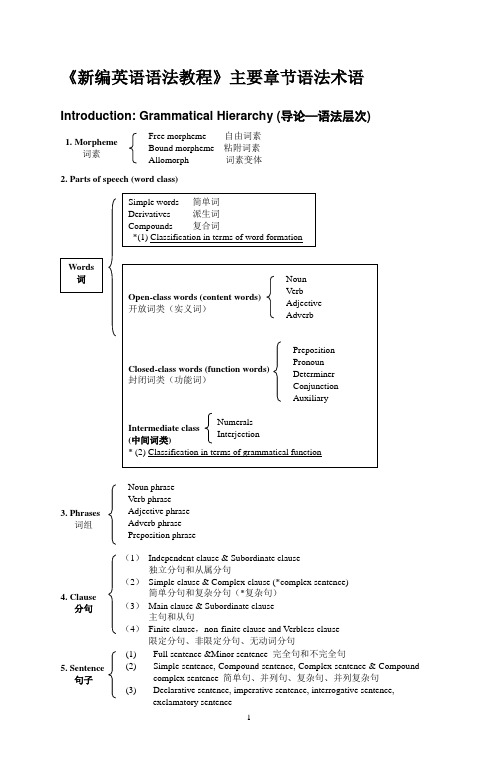
《新编英语语法教程》主要章节语法术语Introduction: Grammatical Hierarchy (导论—语法层次)2. Parts of speech (word class)3. Phrases词组4. Clause分句5. Sentence句子1. Morpheme词素Free morpheme 自由词素Bound morpheme 粘附词素Allomorph 词素变体Noun phraseVerb phraseAdjective phraseAdverb phrasePreposition phraseConjunctionLecture 1 Sentence Structure(L1)Sentence elements:S (subject) 主语V (predicate verb)谓语动词O (object)宾语C (complement)补足语A (Adverbial)状语1. Two ways of sentence analysis1) SVOSentenceClauseNP VP NPSubject Predicate verb ObjectAll the man have done their best.Sentence = Subject + Predicate (Predicate Verb + Object, Complement, Adverbial, etc.)●句子由主语和谓语构成,进一步把谓语剖析为谓语动词、宾语、补语、状语等。
2) Subject + Predicate (= operator + predication)SentenceClauseSubject PredicateOperator PredicationAll the man have done their best.●句子由主语和谓语构成,进一步把谓语剖析为操作词(operator)和述谓成分(predication)。
英语语法复习资料大全

语法复习精品指南(一)词类(parts of speech)英语的词通常分为十大类:1)名词(noun,缩写为n.)是人和事物的名称,如pen(钢笔),English(英语),life(生活)。
2)代词(pronoun,缩写为pron.)是用来代替名词的词,如we(我们),his(他的),all (全部)。
3)形容词(adjective,缩写为adj.)用来修饰名词,如great(伟大的),honest(诚实的),difficult(困难的)。
4)数词(numeral,缩写为num.)是表示"多少"和"第几"的词,如four(四),eighteen(十八),first(第一),eighth(十八),hundred(一百)。
5)动词(verb,缩写为v)表示动作和状态,如write(写),walk(行走),think(想)。
6)副词(adverb,缩写为。
adv.)是修饰动词、形容词和副词的词,如quickly(快),of ten(经常),very(很)。
7)冠词(article,缩写为art.)说明名词所指的人或物的词,如a,an(一个),the(这,那)。
8)介词(preposition,缩写为prep.)表示名词(或代词)与句子里其它词的关系,如fr om(从),in(在…内),between(在…之间)。
9)连词(conjunction,缩写为conj.)是连接词、短语、从句和句子的词,如and(和),because(因为),if(假如)。
10)感叹词(interjection,缩写为int.)表示感情,如。
oh(噢),aha(啊哈),hush(嘘)。
[注一]属于前六类(名、代、形、数、动、副等词)的词都有实义,叫做实词(notional word)。
属于后四类(冠、介、连、感等词)的词没有实义,叫做虚词(form word)。
[注二]不少词可以属于几个词类,如work(工作;动词和名词),fast(快;形容词和副词),since(自从;连词和介词)等。
新编英语语法教程第五版1 Sentence Structure
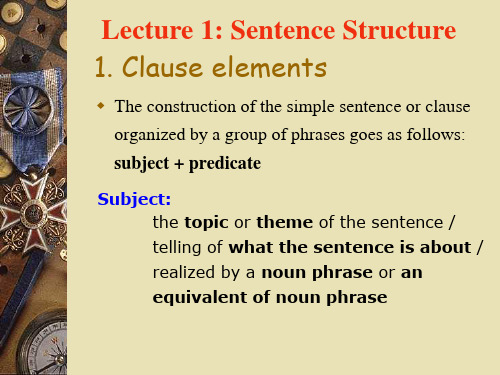
Practice
(2014-TEM4) 53. Which of the following italicized parts is used as an object complement? A. The front door remained locked. B. The boy looked disappointed. C. Nancy appeared worried. D. He seemed to have no money left.
(2011-TEM4) 58. Which of the following italicized parts is used as an object? A. What do you think has happened to her? B. Who do you think the visiting professor is? C. How much do you think he earns every month? D. How quickly would you say he would come? (2010-TEM4) 61. In the sentence "It's no use waiting for her", the italicized phrase is ____. A. the object B. an adverbial C. a complement D. the subject
Lecture 1: Sentence Structure 1. Clause elements
The construction of the simple sentence or clause
新编英语语法教程

导论———语法层次0.1 词素1)自由词素2)粘附词素0.2 词1)简单词、派生词、符合词2)封闭词类和开放词类0.3 词组1)名词词组2)动词词组3)形容词词组4)副词词组5)介词词组0.4分句1)独立分句和从属分句2)简单分句和复杂分句3)主句和从句4)限定分句、非限定性分句、无动词分句0.5 句子1)完全句和不完全句2)简单句、并列句、复杂句、并列复杂句第1讲句子结构1.1 主谓结构和句子分析1)主语和谓语2)句子分析1.2 基本句型及其转换与扩大1)基本句型2)基本句型的转换与扩大第2讲主谓一致(一)2.1指导原则1)语法一致2)意义一致和就近原则2.2 以-s 结尾的名词作主语的主谓一致问题1)以-s结尾的疾病名称和游戏名称2)以-s结尾的学科名称3)以-s结尾的地理名称4)其他以-s结尾的名词2.3 以集体名词作主语的主谓一致问题1) 通常作复数的集体名词2)通常作不可数名词的集体名词3)既可作单数也可作复数的集体名词4)a committee of 等+复数名词第3讲主谓一致(二)3.1 以并列结构作主语的主谓一致问题1)由and/both... And 连接的并列主语2)由or/nor/either...or 等连接的并列主语3)主语+as much as 等4)主语+as well as 等3.2 以表示数量概念的名词词组作主语的主谓一直问题1)以表示确定数量的名词词组作主语2) 以表示非确定数量的名词词组作主语3.3 其他方面的主谓一致问题1)以名词性分句作主语的主谓一致问题2)以非限定分句作主语的主谓一致问题3)关系分句中的主谓一致问题4)分裂句中的主谓一致问题5)存在句中的主谓一致问题第4讲4.1 名词分类和名词词组的句法功能1)名词分类2)名词词组的句法功能4.2 名词的数1)规则复数和不规则复数2)集体名词、物质名词、抽象名词、专有名词的数4.3 单位词1)一般表示个数的单位词2)表示形状的单位词3)表示容积的单位词4)表示动作状态的单位词5)表示成双、成对、成群的单位词第5讲5.1 名词属格的构成、意义和用法1)名词属格的构成2)名词属格的意义3)名词属格的用法5.2 独立属格和双重属格1)独立属格2)双重属格第6讲限定词(一)6.1限定词与三类名词的搭配关系1)能与三类名词搭配的限定词2)只能与单数名词搭配的限定词3)只能与复数名词搭配的限定词4)只能与不可数名词搭配的限定词5)能与单、复数名词搭配的限定词6)能与单数名词和不可数名词搭配的限定词7)能与复数名词和不可数名词搭配的限定词6.2 限定词与限定词的搭配关系1)中位、前位、后位限定词2)三类限定词的搭配关系6.3 若干限定词用法比较1)many, much, a lot of, lots of, plenty of 等2)(a) few ,(a) little3) some, any.4) all,both ,every,each ,either,neither,any第7讲限定词(二)7.1 冠词的类指和特指1)冠词的类指用法2)冠词的特指用法3)后照应特指、前照应特指、语境特指7.2 各类名词前的冠词用法1)冠词与专有名词2)冠词与普通名词3)冠词的其他用法第8讲代词(一)8.1 代词及其先行项的“数的一致”1)先行项为every-, some-等符合词时代词的选择2)先行项为某些并列结构时代词的选择3)先行项为某些集体名词时代词的选择4)先行项为“复数名词或代词+each”时代词的选择8.2 代词及其先行项的“性”的一致1)先行项为阳性或阴性名词时代词的选择2)先行项为通性名词时代词的选择3)先行项为中性名词时代词的选择8.3 代词及其先行项的“人称”一致1)代词及其先行项在句中的人称一致2)语篇中的人称一致第9讲代词(二)9.1 代词的格1)用主格还是用宾格2)用宾格还是用属格9.2 物主代词、反身代词、人称代词的类指用法1)物主代词2)反身代词3)人称代词的类指用法9.3 代词照应1)后照应、前照应、语境照应2)人称照应3)指示照应第10讲10.1 动词分类(一)1)主动词和助动词2)及物动词、不及物动词、连系动词3)动态动词和静态动词10.2 动词分类(二)4)单词动词和词组动词5)限定动词和不限定动词6)规则动词和不规则动词10.3 动词的时、体、态、式该说1)动词的时、体形式2)主动态和被动态3)陈述式、祈使式、虚拟式4)限定动词词组和非限定动词词组第11讲动词的时和体(一)11.1 一般现在式的用法1)表示不受时限的客观存在2)表示现在习惯动作3)表示现时状态和现在瞬间动作4)表示将来时间5)表示过去时间11.2 一般过去时的用法1)表示过去的时间2)表示现在时间和将来时间11.3 现在进行体的用法1)表示说话时正在进行的动作2)表示现阶段正在进行的动作3)表示按计划近期内即将发生的动作4)现在进行体的其他用法11.4 过去进行体的用法1)表示过去某时正在进行的动作2)表示过去某种习惯性动作3)表示过去将来时间里的动作4)表示现在时间和将来时间里的动作5)过去进行体与一般过去时用法比较第12讲动词的时和体(二)12.1 现在完成体和现在完成进行体的用法1)现在完成体的用法2)现在完成进行体的用法3)现在完成(进行)体与过去时用法比较12.2 过去完成体和过去完成进行体的用法1)过去完成体的用法2)过去完成进行体的用法3)在由when/before/after/until等连词引导的分句中过去完成体的用法4)过去完成体的想象性用法12.3关于完成体用法的几点补充说明1)完成体与since-分句2)完成体与have got /have got to3)完成体在“It is the first time + that-分句”中的使用第13 讲将来时间表示法13.1 表示将来时间的多种结构1)will/shall +不定式2)will/shall +不定式进行体/完成体3)be going to +不定式4)be + ing (现在进行体)5)be to + 不定式6)一般现在时13.2 过去将来时间表示法1)would +不定式2)was/ were going to +不定式3)was/ were to + 不定式4)过去进行体和一般过去式5)was/ were about to + 不定式第14 讲被动态(一)14.1 主动句和被动句1)主动句变被动句的转换规则2)主动句与被动句相互转换的限制性14.2 词组动词的被动态1)一般词组动词的被动态2)“动词+ 名词+介词”的被动态14.3 非限定动词的被动态1)不定式的被动态2)-ing 分词的被动态3)不定式被动态和-ing 分词被动态的用法比较15.1 被动句的用法1)被动句的使用场合2)两种被动句型的转换15.2 被动结构和被动意义1)英汉被动意义表示法比较2)主动结构表示被动意义的问题3)被动结构还是系补结构第16 讲虚拟式16.1 be- 型虚拟式1)用于表示命令、决定、建议等词语之后的that 分句中2)用于由if,though等引导的分局中3)由于某些公式化语句中16.2 were-型虚拟式1)用于某些状语分句中2)用于某些名词性分句中16.3 假设意义表示法综述1)用动词的过去时形态表示假设意义2)用情态助动词过去时形式表示假设意义第17 讲助动词(一)17.1 情态意义表示法1)表示“能力”和“可能”2)表示“许可”和“不许”3)表示“义务”和“必然”4)表示“预见”和“推测”5)表示“意愿”、“意图”和“决心”6)其他情态意义17.2 情态助动词的推测性用法和非推测性用法1)能作推测性用法的情态助动词2)能作推测性用法的情态助动词的句法特征3)能作推测性用法的情态助动词与所指时间第18 讲助动词(二)18.1 半助动词1)半助动词的类型2)半助动词与“it...that”结构18.2 助动词的缩略形式1)否定缩略形式2)肯定缩略形式3)非缩略形式的使用场合19.1 不定式的结构形式1)不定式的一般形式、进行体和完成体形式2)带to不定式与不带to不定式19.2 关于不定式符号的几个问题1)不定式符号的单独使用问题2)不定式符号的省略问题3)不定式符号to 与介词to的辨别问题第20 讲不定式(二)20.1 不定式与形容词的搭配关系1)主句主语是不定式结构的逻辑主语2)主句主语是不定式结构的逻辑宾语3)主句主语是不定式结构的逻辑主语或宾语20.2 不定式与名词的搭配关系1)主——动关系,动——宾关系、同位关系2)用主动态还是用被动态3)“名词+不定式”与“名词+介词+ing分词”20.3 不定式与动词的搭配关系1)动词+不定式2)动词+宾语+不定式3)动词+(宾语)+不定式第21 讲—ING分词21.1 —ing分词与动词的搭配冠词1)能带—ing分词而不能带不定式动词的动词2)动词+宾语+介词+ing分词21.2 既能直接带不定式又能直接带—ing分词的动词1)既能带不定式和--ing分词而意义无甚区别的动词2)既能带不定式和--ing分词而意义不同的动词第22 讲---ED分词22.1 --ed分词作前置修饰语1)来自及物动词的-ed分词作前置修饰语2)来自不及物动词的-ed分词作前置修饰语22.2 -ed分词作补语1)古英语遗留下来的几个—ed 分词的用法问题2)能带—ed分词作宾语补语的动词分类22.3 关于“悬念分词”1)“依着法则”和“悬念分词”2)关于“悬念分词”的可接受性问题第23 讲形容词和形容词词组23.1 形容词分类1)单词形容词和复合形容词2)中心形容词和外围形容词3)动态形容词和静态形容词4)等级形容词和非等级形容词23.2 形容词与分词1)由—ing分词转化来的形容词2)有—ed分词转化来的形容词3)主动意义和被动意义23.3 形容词(词组)作名词修饰语1)形容词(词组)的前置和后置2)补语形容词3)形容词词组与关系分句23.4 形容词词组作补语1)形容词+介词词组2)形容词+不定式3)形容词+that-分句第24 讲副词和副词词组24.1 副词和副词词组的主要用法1)副词在词组中作修饰语2)副词词组在句中作状语24.2 兼有两种形式的副词1)关于clean / cleanly 2)关于clear / clearly 3)关于close / closer 4)关于dead / deadly 5)关于direct / directly 6)关于easy / easily 7)关于fair / fairly 8)关于firm / firmly 9)关于high / highly 10)关于loud / loudly 11)关于pretty / prettily 12)关于right / rightly 13)关于sharp / sharply 14)关于slow / slowly 15)关于sure / surely第25 讲比较等级和比较结构25.1 形容词和副词的比较等级1)形容词比较等级和最高级的规则形式2)副词比较级和最高级的规则形式3)形容词、副词比较级和最高级的不规则形式25.2 比较结构1)as....as.....结构2)more ....than 结构3)“the + 形容词/副词最高级+比较范围”结构25.3 关于比较结构用法的补充说明1)more....than结构的其他用法2)not so...as 与not so much....as3)not more / -er than 与no more / -er than 4)the more... the more与more and more第26 讲介词和介词词组26.1 介词与形容词、动词、名词的搭配关系1)介词与形容词的搭配2)介词与动词的搭配3)介词与名词的搭配26.2 复杂介词1)双词介词2)三词介词3)四词介词26.3 介词词组与某些限定分句的转换关系1)介词词组在意义上相当于that-分词2)介词词组在意义上相当于状语分词3)介词词组在意义上相当于关系分句第27 讲陈述句、疑问句、祈使句、感叹句27.1 陈述句1)肯定陈述句2)否定陈述句27.2 疑问句1)一般疑问句2)特殊疑问句3)选择疑问句4)附加疑问句27.3 祈使句和感叹句1)祈使句2)感叹句第28 讲存在句28.1 存在句的结构特征1)存在句的引导词2)存在句的实义主语3)存在句的谓语动词28.2 存在句的非限定形式1)作介词补足成分2)作宾语3)作主语和宾语第29 讲IT- 句型29.1 “虚义”it 和“先行”it1)“虚义”it2)“先行”it29.2 “分裂句引导词”it1)什么是分裂句2)“分裂句引导词”it与“先行”it3)“拟似”分裂句第30 讲30.1 并列结构的各种形式1)并列结构的构成2)并列连词和标点符号3)并列结构中的插入语4)并列结构中的对称组合30.2 并列连词的意义和用法1)以and为代表的表示语义引申的并列连词2)以or为代表的表示选择的并列连词3)以but为代表的表示语义转折和对比的并列连词第31讲从属结构(一)31.1 并列与从属1)从属是语义上分清主次的手段2)从属连词31.2 限定从属分句1)名词性分句2)形容词性分句(关系分句)3)副词性分句(状语分句)31.3 关于状语分句的几点补充说明1)when,while,as,before,after,until的用法2)because,for,since,as, now that结构3)关于so that 和so ... that 结构4)关于unless 和if...not5)关于though 和although第32讲从属结构(二)32.1 不定式分句1)不定式分句的结构模式2)不定式分句的句法功能32.2 -ing分词分句1)-ing分词分句的结构模式2)-ing分词分句的句法功能32.3 -ed分词分句1)-ed分词分句的结构模式2)-ed分词分句的句法功能32.4 无动词分句1)无动词分句的结构模式2)无动词分句的句法功能32.5 关于“独立结构”1)“独立结构”的实质和类型2)“独立结构”的用法和意义第33 讲关系分句33.1 限制性关系分句和非限制性关系分句1)限制性关系分句2)非限制性关系分句33.2 关系词的选择1)在限制性关系分句中关系代词的选择2)在限制性关系分句中关系代词的其他用法3)在非限制性关系分句中关系代词的选择4)关系词的省略问题33.3 由“介词+关系代词”引导的分句结构1)由“介词+关系代词”引导的限定分句2)由“介词+关系代词”引导的非限定分句33.4 双重关系分句和嵌入式关系分句1)双重关系分句2)嵌入式关系分句第34 讲条件句34.1 第一种类型条件句(Type 1 )1)表示普遍真理和客观事实2)表示现在习惯动作3)表示过去习惯动作34.2 第二种类型条件句(Type 2 )1)第二种类型条件句的基本形式2)第二种类型条件句的变体形式3)第二种类型条件句的替换形式34.3 第三种类型条件句(Type 3 )1)第三种类型条件句的基本形式2)第三种类型条件句的变体形式34.4 第四种类型条件句(Type 4 )1)第四种类型条件句的基本形式2)第四种类型条件句的变体形式第35 讲直接引语和间接引语35.1 陈述句的间接引语1)现在时间推移到过去时间2)过去时间推移到过去的过去3)将来时间推移到过去将来时间4)人称代词、限定词、时间状语、地点状语的变化35.2 疑问句的间接引语1)疑问句间接引语的引导词问题2)疑问句间接引语的交际功能问题35.3 祈使句和感叹句的间接引语1)祈使句的间接引语2)感叹句的间接引语35.4 各类句子混杂使用时的间接引语1)根据表意需要增添词语2)根据表意需要调整句子结构或改变说法第36 讲修饰36.1 名词修饰语1)前置修饰语和后置修饰语2)限定性修饰语和非限定性修饰语3)分隔修饰36.2 同位语1)名词词组同位语的结构形式2)名词词组同位语的引导词3)名词词组同位语的附加修饰成分4)限定性同位语和非限定性同位语36.3 状语1)修饰性状语2)评注性状语3)连接性状语第37 讲替代37.1 名词性替代1)什么是名词性替代2)替代词one / ones 的用法3)替代词one ,类指代词one和数词one4)替代词one / ones 和实义词one /ones37.2 动词性替代1)什么是动词性替代2)动词替代词的用法37.3 分句性替代1)什么是分句性替代2)分句替代词的用法第38 讲省略38.1 并列结构中的省略现象1)并列句中的省略现象2)名词词组中的省略现象3)介词词组中的省略现象38.2 主从结构中的省略现象1)主句中的省略现象2)状语分句中的省略现象3)名词性that-分句中的省略现象4)名词性wh-分句中的省略现象第39 讲后置、前置、倒装39.1 后置1)句尾焦点和句尾重心2)关键词语的后置39.2 前置与倒装1)不引起倒装的前置2)引起倒装的前置第40 讲从句到篇40.1 句子和语篇1)句子的意义和交际功能2)句子结构的正确性和适合性40.2 语篇纽带1)连句成篇的逻辑纽带2)连句成篇的语法纽带3)连句成篇的语汇纽带40.3 语篇结构——句子、语段、语篇1)什么是语段2)从语段到语篇40.4 主题语段和辅助语段1)单语段语篇和多语段语篇2)主题语段(或主题句)和辅助语段(或辅助句)。
新编英语语法简明教程第16章

第16章限定词Multiple choice:1)The sign reads "In case of_____fire break the glass and push_____button".A. /; aB./; theC. the; theD. a; a答案:B 第一空fire这里是泛指,且fire这里不可数,应使用零冠词;第二空是特指。
2)An accident happened at_____crossroads a few metres away from______bank.A.a; aB. /; aC./; theD. the;/答案:A 这里的两空都是泛指,“一家银行附近的一个十字路口”3) On_____news today, there were_____reports of heavy snow in that area.A. the; theB. the;/ C/./; D. /; the答案:B 第一空是特指,第二空是泛指,复数名词泛指应该使用零冠词。
4) When you come here for your holiday, don't go to_____hotel; I can find you_____bed in my flat.A. the; aB. the;/C. a; theD. a; /答案:A go to the hotel是固定短语,表示“去宾馆”,find/give sb a bed表示“给某人(找)一个睡觉的地方”。
5) When he left_____college, he got a job as_____reporter in a newspaper office.A./;aB. /; theC. a; theD. the; the答案:A leave college是一个固定短语,表示“大学毕业”,第二空是泛指。
新编英语语法教程pdf

新编英语语法教程pdf
《新编英语语法教程》是一本非常实用的英语语法学习资料,它系统地介绍了英语语法的各个方面,特别适合初学者和中级水平的学生使用。
本书具有很多优点,下面我将从内容丰富性、易学性和实用性三个方面进行详细介绍。
首先,本书的内容丰富性令人印象深刻。
它详细讲解了英语语法的各个方面,涵盖了从基础知识到高级应用的内容。
其中包括词汇、句子结构、时态和语态等基础知识,也包括虚拟语气、倒装句和非谓语动词等高级应用。
通过学习这本书,学生可以全面掌握英语语法的要点,提高自己的语言水平。
其次,本书易学性非常强。
作者在编写本书时采用了简明扼要的写作风格,避免了冗长繁琐的解释。
同时,书中还配有大量的例句和练习题,帮助学生理解和应用所学的知识。
此外,本书还提供了重要的语法规则总结和常见错误的纠正,让学生更加方便地学习和消化所学的知识。
最后,本书具有很强的实用性。
每个章节的内容都与实际语言运用紧密相关,帮助学生理解语法知识与实际交流的联系。
此外,书中还提供了大量的实例和实际应用场景,让学生能够在具体语境中学习和掌握语法规则。
这样的设计有助于学生将所学的知识应用到日常生活和学习中去,提高他们的英语交流能力。
总之,《新编英语语法教程》是一本非常实用的英语语法学习资料。
它内容丰富、易学性强,并具有很强的实用性。
通过学
习这本书,学生可以全面掌握英语语法的要点,提高自己的语言水平。
无论是初学者还是中级水平的学生,都可以从中受益匪浅。
强烈推荐这本书作为英语语法学习的教材。
英语句法讲解(参考新编英语语法教程章振邦)

6、状语从句
• 定义:有that, what, why, how等疑问词引导的分句做句子的状 语。
• 1). 时间状语 • Whenever yowon’t stand by.
Camille
一、句子成分
• 1. Everybody laughed.
主
谓
• 2. Lily wants a fan.
主谓 宾
• 3. Mary lent me her car.
主 谓 间宾 直宾
• 4. Someone left you a note.
主 谓 间宾 直宾
• Note: 间宾,即间接宾语,通常是“人”。 直宾,即直接宾语,通常是“物”。
• 7)条件状语 • Provided(= If) he won the competition, he would get the
opportunity to study abroad.
• 8)让步状语 • Rich as he is, Mr. Johnson is by no means a happy man.
5、定语从句
• 定语从句是用于修饰主句中的名词,关系词which, that, who 等代替主句中的某个成分做从句的一部分。
• e.g. • She is a women who was blessed by God. • All that live must die. • Taylor is the most elegant woman that ever cooperated
• 3. 关系副词when, where, where 的用法 • I shall never forget the day when(=on which) we first
- 1、下载文档前请自行甄别文档内容的完整性,平台不提供额外的编辑、内容补充、找答案等附加服务。
- 2、"仅部分预览"的文档,不可在线预览部分如存在完整性等问题,可反馈申请退款(可完整预览的文档不适用该条件!)。
- 3、如文档侵犯您的权益,请联系客服反馈,我们会尽快为您处理(人工客服工作时间:9:00-18:30)。
1.主谓一致主谓一致Subject-Verb Concord即谓语动词在人称和数上要和主语保持一致,主谓一致包括语法一致、意义一致和就近一致。
指导原则语法一致语法一致即谓语动词在单复数形式上要和主语保持一致eg.A grammar book helps you learn something about the rules of a language. (主语是单数形式,谓语也采取单数形式)语法书帮助你学习语言的某些规则.Grammar books help you learn something about the rules of a language. (主语是复数形式,谓语也采取复数形式)语法书帮助你学习语言的某些规则.意义一致和就近原则意义一致就是谓语动词要和主语意义上的单复数保持一致。
补充解释和例句见书P22就近一致就是谓语动词要和靠近它的主语部分保持一致。
常出现在这类句子中的连词有:or, either…or…,neither…nor …,not only…but also …等.例句见书P23英语中,有时几个名词或代词有某些此连接起来一起作句子的主语,此时,谓语动词的形式就须有与之最接近的名词或代词的人称和数决定。
如:(1) There is a desk and five chairs in his room. 他房间里有一张办公桌和五把椅子。
There are five chairs and a desk in his room. 他房间里有五把椅子和一张办公桌。
(2) Either you or Li Lei is going to be sent there. 要么是你要么是李蕾将被派到那里去。
Are either you or Li Lei going to be sent there 是你将被派到那里去还是李蕾将被派到那里去结尾的名词作主语以-s结尾的疾病名称和游戏名称以-ics结尾的学科名称以-s结尾的地理名称其他以-s结尾的名词以集合名词作主语通常作复数的集体名词见书P27【注】goods(货物), clothes(衣服)只有复数形式,且只表示复数意义:Such clothes are very cheap. 那样的衣服很便宜。
All the goods have been sent to them. 所有的货物都给他们送去了。
通常作不可数名词的集体名词clothing(衣服),poetry(诗歌),baggage / luggage(行李), furniture(家具),machinery(机械),scenery(景色),jewelry(珠宝),equipment(设备)等集合名词通常只用作不可数名词,表示单数意义,用作主语时,其后谓语动词用单数形式。
既可做单数也可作复数的集体名词family(家庭),team(队,队员),class(班,班上的全体学生),crowd(人群),government(政府),crew(乘务员),committee(委员会),audience(听众),public(公众)等集合名词,当它们表示整体意义时,表单数意义,当它们强调个体意义时,表示复数意义。
【注】有时没有特定的语境,用单复数谓语均可以:The audience was (were) very excited by the show. 观众对演出甚感激动。
The public has (have) a right to know what’s in the report. 公众有权知道这篇报告的内容。
如将侧重点放在组成集体的成员上,动词用复数。
a committee of 等+复数名词见书P27以并列结构作主语由and和both...and连接的并列主语【注意】当由and连接的两个并列主语受each, every, no的修饰时,谓语用单数:Every boy and (every) girl likes the book. 每个男孩女孩都喜欢这本书。
No desk and (no) chair was seen in the room. 房间里不见桌椅。
当and连接两个数相加时,谓语动词可用单数或复数:Six and eight makes [make] fourteen. 六加八等于十四。
当and连接的两个的词语指同一个人或事物时,谓语通常要用单数:A cart and horse was seen in the distance. 远处看见一辆马车。
由or, nor, either...or, neither…nor, not only…but also, not…but等连接的并列主语就近原则处理The teacher as well as the students has read it 不仅学生读过它,老师也读过。
The teacher rather than the students is to blame. 应受责备的是老师而不是学生。
主语+as much as等书P30主语+as well as等书P30以表示数量概念的名词词组作主语以表示确定数量的名词词组作主语表时间长度、钱数、速度等的词组作主语此时通常将其视为整体,谓语用单数。
eg. Twenty years is a long time. 20年是很长的时间。
Ten dollars is all I have left. 我只剩下10美元。
如果看作组成该数量的一个个的个体,谓语用复数。
eg. There are six silver dollars in each of the stockings.“分数(百分数)+of+名词”结构作主语谓语动词形式依of-词组中的名词类别而定。
例句见书P32【注意】在现代英语中,有时即使该结构中的名词为复数,其谓语也可用单数(即将其视为整体):Over sixty per cent of families own [owns] a television. 百分之六十以上的家庭已拥有电视机。
两数相减或相除,动词用单数;两数相加或相乘,动词可以用单数,也可以用复数。
例句见书P32“one in /one out of +复数名词”作主语在正式语体中,动词用单数;在非正式语体中,动词也可按“就近原则”用复数。
例句见书P32以表示非确定数量的名词词组作主语主语是all of…,some of…,none of…,half of…,most of…等表示非确定数量的名词词组,其后的动词形式依of- 词组的名次类别而定。
例句见书P32主语是由“lots of,heaps of, loads of, scads of, plenty of+名词”构成,表示“许许多多”等概念时,随后动词的单复数形式也依of- 词组的名次类别而定。
主语是由"a portion of,a series of,a pile of,a panel of+名词"构成,不管名词类别如何,动词通常用单数。
主语是由“限定词+a kind/ sort/ type of +名词”构成,随后的动词形式按以下规则:在a kind/ sort/ type of,this kind/ sort/ type of之后通常加单数或不可数名词,动词用单数。
如果要用复数名词:名词复数+of this kind/ sort/ typeRoses of this kind are very sweet出现在these kinds of,many/several kinds of 后的名词,既可以是单数或不可数名词。
也可以是复数名词,动词用复数。
在非正式语体中,常见“these/those kind of +复数名词”作主语,随后的动词用复数。
主语是由"many a+名词"或"more than one+名词"构成,其意义虽属多数,但随后的动词仍遵循"语法一致"原则,用单数。
如果主语由"an average of/a majority of+复数名词"构成,而且明确表示多数个体概念,随后的谓语动词用复数;如果这类主语不表示多数个体概念,随后的谓语动词用单数。
其他方面的主谓一致问题名词性分句作主语时的主谓一致名词性分句作主语时,随后的动词一般使用单数,但有时也会有主谓一致的问题:由what,who,why,how,whether等wh-词引导的名词性分句作主语,其后的动词通常用单数。
两个由and连接的并列名词性分句作主语,如果主语表示两件事,动词用复数。
在以what-分句作主语的SVC结构中,如果主语补语是复数名词,主语谓语动词可用复数。
如果what-分句本身明显表示富士意义,那么主句动词也可用复数。
以非限定分句作主语的主谓一致以非限定分句(主要是不定式分句和ing分词分句)作主语,随后动词通常用单数由and连接的并列非限定分句作主语,如果指两件事,动词用复数;如果指一件事,动词用复数。
关系分句中的主谓一致在"one of+复数名词+who/that/which"引导的定语从句中,从句谓语的单复数取决于one前是否有the only, the very。
如果有,从句的谓语动词用单数,如没有,就用复数形式。
分裂句中的主谓一致在强调句中,由that/who引导的从句的动词形式通常依先行词而定。
在"It is I+ who从句"+的动词现在时在人称和数的形式上应与I保持一致。
存在句中的主谓一致在存在句中,要使用就近原则,即谓语动词的单复数形式一般取决于离谓语最近的那个名词或词组的单复数形式。
2.名词属格名词属格的构成、意义和用法(1)名词属格的构成(加-’s)A)单数名词和不以-s结尾的复数名词一般在词尾加-’s如:Milltown's poems,my mother’s arrival,women’s clothes。
B) 以-s 结尾的复数名词在词尾只加-',如:the girls’dormitory。
C)复合名词和作为一个整体的名词词组构成属格时,在最后一个词的结尾加's如:my mother-in-law’s death,an hour and a half’s talk,somebody else’s opinion* 以-s 结尾的普通名词后加’s,或者只加’。
D)并列名词表示各自的所有关系时,要在各个名词之后加-'s如Mary’s and Bob’s book。
如果仅在第二个名词之后加-‘s(Mary and Bob’s),则指两人共有的书。
